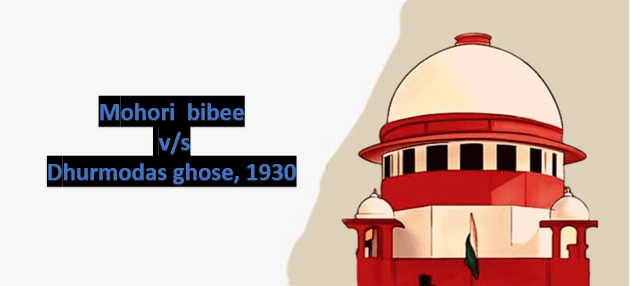
Mohori bibee v/s Dharmodas ghose, 1930
| Citation | [1903] UKPC 12, (1903) LR 30 IA 114 |
| Date of Judgment | 4 March, 1903 |
| Court | Judicial Committee of the Privy Council |
| Appealed from | High Court of Judicature at Fort William |
| Appellate | Mohori Bibee |
| Respondent | Dhurmodas Ghose |
| Bench | Lord McNaughtonLord DaveyLord LindleySir Ford NorthSir Andrew ScobleSir Andrew Wilson. |
| Decision by | Sir Ford North |
| Referred | Section- 38,41,68 of the Indian Contract Act,1972 |
Parties related to the case-
- Dharmodas Ghose –Plaintiff, minor
- Mohori Bibee – Wife of Brahmo Dutta and his legal representative of the case.
- Brahmo Dutta- The moneylender who entered into contract with a minor.
- Kedar Nath- Attorney, agent of Brahmo Dutta.
FACTS OF THE CASE-
Dharmodas Ghose is the respondent of the case and he was a minor(minor means below the age of 18 years and not competent to contract legally). He was the single owner of his immovable property and his mother was authorized as a legal custodian.
He mortgaged his own immovable property with Brahmo Dutta and he secured this mortgage deed for Rs.20,000 at 20% per year of interest rate.
At that time Brahmo Dutta was a money lender and the management of his business was controlled by Kedar Nath and he acted as attorney of Brahmo Dutta.
Dharmodas Ghose’s mother sent a message to Brahmo Dutta which informing about the minority of Dharmodas Ghose. The attorney of Brahmo Dutta has knowledge about the minority and incompetency of Dharmodas Ghose to enter any contract related to such immovable property.
After that, on 10th sept.,1895 Dharmodas Ghose along with his mother entered into a legal suit against Brahmo Dutta by saying that the mortgage which was made by Dharmodas was commenced when he was minor because of this such mortgage was void and improper and as a result of such contract should be revoked.
During this petition Brahmo Dutta had died then further petition was litigated by his executors.
The plaintiff argued that no relaxation should be provided to them because there is dishonest or deceitful misrepresentation by defendant about his age and because of this mortgage is cancelled at the request of defendant i.e., Dharmodas Ghose.
Mohori Bibee is the appellate of the case but she is the executive and legal representative of Brahmo Dutta.
ISSUE RAISED IN THE CASE-
- Whether deed was void under section 2, 10(5), 11(6) of contract act or not?
- Whether the mortgage commenced by the defendant was voidable or not?
- Whether the defendant was liable to return the amount of loan which he had received by him under such deed or mortgage or not?
ARGUMENTS OF THE CASE-
Appellant’s Arguments:
- The respondent was a major when he executed the mortgage. Neither the appellant nor his agent had any notice that the respondent was a minor. The respondent made a fraudulent declaration regarding his age and is hence dis-entitled from seeking any relief.
- The respondent is stopped by section 115 of the Indian Evidence Act, 1872 from claiming that he was a minor at the time of executing the mortgage.
- Section-115 of the Indian Evidence Act,1872 state that When one person has, by his declaration, act or omission, intentionally caused or permitted another person to believe a thing to be true and to act upon such belief, neither he nor his representative shall be allowed, in any suit or proceeding between himself and such person or his representative, to deny the truth of that thing.
- The respondent must repay the amount advanced according to section 64 and 38 of Indian Contract Act (1872) and section 41 of Specific Relief Act (1877).
- Section-38 of the Indian Contract Act,1872 states that Where a promisor has made an offer of performance to the promisee, and the offer has not been accepted, the promisor is not responsible for non-performance, nor does he thereby lose his rights under the contract.
- Section-41 of the Indian Contract Act,1872 state that When a promisee accepts performance of the promise from a third person, he cannot afterwards enforce it against the promisor.
- Section-64 of the Indian Contract Act,1872 state that When a person at whose option a contract is voidable rescinds it, the other party thereto need not perform any promise therein contained in which he is promisor.
Respondent’s Arguments:
- Brahmo Dutta and his agent Kedar Nath possessed knowledge of the respondent’s actual age.
- Since the respondent was a minor at executing the mortgage, the contract is void.
JUDGMENT-
Privy Council held that the agreement entered into with minor is void ab initio i.e. void from the very beginning. The court further held regarding the contentions of the defendant that, firstly, the law of estoppel will not apply since the attorney of Brahmodutt had knowledge of fact of the minority of Dharmodas. Secondly, Section 64 and 65 of Indian Contract will not apply as there wasn’t an agreement at the first place and for the application of Section 64 and 65 the contract must be between competent parties.
Therefore, a precedent of minor’s agreement is void ab initio had been laid down in the present case.
REFERENCE-
- https://en.wikipedia.org
- https://www.legalserviceindia.com
This article is written by Padmawati of Shri Ramswaroop Memorial University, intern at Legal Vidhiya.



0 Comments